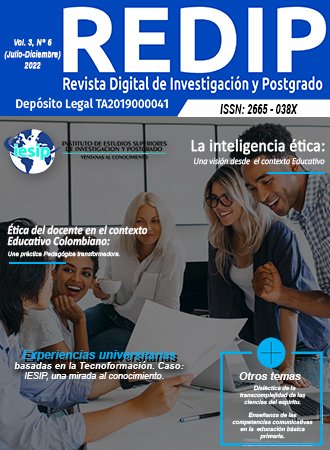Managerial vision regarding the formation of the entrepreneurialspirit of university students.
Case: Unellez, Venezuela
DOI:
https://doi.org/10.59654/5gq2gh44Keywords:
Management, entrepreneurship, university students.Abstract
The study of entrepreneurship in university students is a topic of important economic and academic interest that is based on various motivational theories that have been put forward in the field of psychology. Entrepreneurship studies have allowed an understanding of the reasons why people become creators and managers of their own companies. The aim of this paper is to analyse the managerialvision at Unellez with respect to the formation of the entrepreneurial spirit of students. In this sense, a documentary, field and descriptive design is proposed. For this reason, a bibliographic review, information gathering and data analysis were used. At the same time, Mendeley and Zotero were used to organise the bibliography and the advanced search was carried out in databases and open access research repositories in the main national and international universities, as well as other types of documents from journals and scientific publications that deal with the topic of study. In addition, two census samples were used, one consisting of 126 students and the other of 20 professors with managerial positions at Unellez Santa Bárbara. Google forms were used as a survey technique, Likert Scale type, which measure the Entrepreneurial Spirit in their respective synergies. The instruments were validated by Expert Judgement. The Cronbach's Alpha coefficient obtained for the instrument applied to students was 0.772 (with 15 items). The Alpha coefficient of the instrument applied to teachers was 0.778 (with 15 items). This reliability value is high according to Ruiz (2013). It is concluded that the formation of the entrepreneurial spirit of students at Unellez has been neglected.
Downloads
References
Almaguer, I. y Nicolás, J. Á. (11 de septiembre de 2017). Determinación de los factores que en el contexto universitario motivan la intención de emprender. Tesis de fin de master. Cantabria, España: Universidad de Cantabria. https://dialnet.unirioja.es/servlet/dctes?codigo=139820
Arroyo, V. M. (2016). Emprendimiento y Universidad Emprendedora: conceptualización, propuesta metodológica y caracterización de la Universidad Politécnica de Valencia. Tesis Doctoral no Publicada. Valencia, España: Universitat Politècnica de València. doi:10.4995/Thesis/10251/61459.
Ayuntamiento de Madrid. (29 de abril de 2021). Gestión de conflictos para emprendedores. Portal web de Madrid Emprende: https://www.madridemprende.es/es/agenda/Agenda/evento/gestion-de-conflictos-para-emprendedores/f4d1be2b7454a01931ba0c672435a0a3/
Belausteguigoitia, R. I. (2012). Empresas Familiares. Dinámica, equilibrio y consolidación. Mc Graw Hill.
Benites, C. R. I. (2013). El rol de las universidades en el fomento al emprendimiento. Ponencia, (págs. 1-11). Esmeraldas, Ecuador. https://www.researchgate.net/publication/301521312_El_rol_de_las_universidades_en_el_fomento_al_emprendimiento/link/5720f35b08aea92aff8b20d8/download
Radrigán, M. D. (2012). Gestión y Liderazgos en los Emprendimientos Sociales: El caso del Sector No Lucrativo Chileno. (U. Bolivariana, Ed.) Polis, Revista de la Universidad Bolivariana, 32(2), 141-165. https://scielo.conicyt.cl/pdf/polis/v11n32/art09.pdf
Borjas de Xena, L. (2012). Cultura y Espiritu Empresarial: Una visión integral y trasnacional en la organizaciones latinoamericanas. Caracas: Unesr.
Borjas, G. J. & Bronars, S. (1988). Consumer discrimination and self-employment. National Bureau of Economic Research Cambridge(2627). https://www.nber.org/system/files/working_papers/w2627/w2627.pdf
Caicedo, G. (didiembre de 2013). El rol de la universidad en ecosistemas de innovación. ASPAE, 3(30).
Campos, O. R. y Méndez, G. C. (2013). La enseñanza. Revista Amazonia Innvestiga, 2(2). http://www.udla.edu.co/revistas/index.php/amazonia-investiga/article/view/15
Day, D. V. (2000). Leadership development: A review in context. The Leardership Quaterly, 11(4), 581-613. https://www.researchgate.net/publication/222531137_Leadership_Development_A_Review_in_Context
Domínguez, T. E. y Rodríguez, A. I. (2020). El emprendimiento socio - productivo Universitario: una estrategia para la liberación. (Unellez, Ed.) Revista del Observatorio Digital Latinoamericano Ezequiel Zamora, 3(1), 11-43. http://revistas.unellez.edu.ve/index.php/rodlez/article/view/1123/1012
Elías, T. (2015). La familia es importante en el éxito de los emprendedores. Universidad de Piura: https://udep.edu.pe/hoy/2015/05/el-apoyo-de-la-familia-es-importante-para-el-exito-de-los-emprendedores/
Enric, L. C. (10 de marzo de 2018). La autocrítica como del emprendedor. Economía. https://cronicaglobal.elespanol.com/ecoonomia/opinion-ecoonomia/la-autocritica-como-base-del-emprendedor_126503_102.html
Formichella, M. M. y Massigoge, J. I. (2004). El concepto de emprendimiento y su relación con el empleo, la educación y el desarrollo local. Conferene: VII VII Congreso Nacional e internacional de Administración, y XI CONAMerco (Congreso de Administración del MERCOSUR). Buenos Aires. https://www.researchgate.net/publication/281465619_El_concepto_de_emprendimiento_y_su_relacion_con_el_empleo_la_educacion_y_el_desarrollo_local
Freire, R. Ma. T. (2017). Formación para el emprendimiento en la enseñanza de economía y escuela de negocios. Tesis para optar al grado de doctora. Madrid, España: Universidad Complutense de Madrid. http://eprints.ucm.es/40779/1/T38236.pdf
Gartner, W. B. (1985). A conceptual framework for describing the phenomenon of new venture creation. Academy of Management Rewview, 10(4), 696-706. https://www.researchgate.net/publication/228314467_A_Conceptual_Framework_for_Describing_the_Phenomenon_of_New_Venture_Creation/link/00b4953c92c62070fa000000/download
Glass, G. y Stanley, J. (1987); Métodos Estadísticos Aplicados a las Ciencias Sociales. Ed. Prentice-Hall Hispanoamericana.
González-García, G., Becerril, C. M. L. y Fonseca, M. A. (2018). El engagement como factor de formación y desarrollo de la cultura emprendedora en estudiantes universitarios. IE Revista de Investigación Educativa de la REDIECH, 9(1), 103-118. http://www.scielo.org.mx/pdf/ierediech/v9n17/2448-8550-ierediech-9-17-103.pdf
Goodwill Community Foundation. (s.f). Emprendimiento: recursos humanos. https://edu.gcfglobal.org/es/emprendimiento/recursos-humanos/1/
Graham, P. (Jul de 1996). Mary Parker Follett-Prophet of Management: A Celebration of Writings from the 1920's. The Academy of Management Review, 21(3), 863-867. doi:doi:10.2307/259005
Horstmanshof, L. y Zimitat, C. (2007). Future time orientation predicts academic engagement among first-year university students. British Journal of Educational Psychology, 703-718. doi:doi:10.1348/000709906X160778
Hurtado de Barrera, Jaqueline. (2012). Metodología de la investigación holística. (5a. ed.). Caracas: Fundación Sypal.
Kirby, D. A. (2002). Entrepreneurship education: can business schools meet the challenge? Education + Training, 46(8/9), 510-519. https://www.researchgate.net/publication/228315059_Entrepreneurship_Education_Can_Business_Schools_Meet_the_Challenge/link/551902760cf2d70ee27b7855/download
Kliksberg, B. (2011). Emprendedores Sociales. Los que hacen la diferencia. (F. Claritas, Ed.) EditorialTemas.
Krueger, Jr. N. F. (1994). The cognitive psychology of entrepreneurship. Handbook of entertreneurship research, 1, 105-140. doi:10.1007/0-387-24519-7_6
Ovalles-Toledo, L. V., Mpreno, F. Z., Olivares, U.M. A. y Silva, G. H. (2018). Habilidades y capacidades del emprendimiento: un estudio bibliométrico. (U. d. Zulia, Ed.) Revista Venezolana de Gerencia, 23(81), 217-230. https://www.redalyc.org/jatsRepo/290/29055767013/29055767013.pdf
Paz, M., Grau, J. y Possi, F. (2014). La Formación de un Profesional Universitario. FERMENTUM, 24. http://www.saber.ula.ve/bitstream/handle/123456789/42844/articulo1.pdf?sequence=1yisAllowed=y
Reche, V. S. . (2017). Influencia de la carrera profesional en la intención emprendedora del personal docente e investigador universitario. El caso de la Universidad de Jaén. Tesis de fin de Master. Jaén, Jaén, España. http://tauja.ujaen.es/bitstream/10953.1/6063/1/TFM%20Reche%20Valdivia.pdf
Red Autónomos. (10 de octubre de 2018). ¿Qué es una red de emprendedores? https://redautonomos.es/emprendedores/red-emprendedores
Romero, V. (18 de enero de 2019). La importancia de la perseverancia en los negocios. Ruiz-Healy Times. https://ruizhealytimes.com/vr/la-importancia-de-la-perseverancia-en-los-negocios/
Tavakol, M. & Dennick, R. (s.f). Making Sence of Cronbach´s Alpha. International Journal of Medical Education, 2, 53-55. doi:10.5116/ijme.4dfb.8dfd
Universidad de León. (2014). Toma de decisiones y solución de problemas. https://servicios.unileon.es/formacion-pdi/files/2013/03/TOMA-DE-DECISIONES-2014.pdf
Unesco-Iesalc. (2020). Covid-19 y educación superior: De los efectos inmediatos al día después. https://www.iesalc.unesco.org/wp-content/uploads/2020/05/COVID-19-ES-130520.pdf
Venderll, G. E. y Vallés, C. A. (2017). Empresa e iniciativa emprendedora. Editorial Síntesis.
Downloads
Published
Issue
Section
License
Copyright (c) 2022 Revista Digital de Investigación y Postgrado

This work is licensed under a Creative Commons Attribution-NonCommercial-ShareAlike 4.0 International License.
Esta licencia permite a los reutilizadores distribuir, remezclar, adaptar y desarrollar el material en cualquier medio o formato únicamente con fines no comerciales, y solo siempre que se atribuya al creador. Si remezclas, adaptas o construyes sobre el material, debes licenciar el material modificado bajo términos idénticos. CC BY-NC-SA incluye los siguientes elementos:
![]() POR: se debe dar crédito al creador.
POR: se debe dar crédito al creador.![]() NC: Sólo se permiten usos no comerciales de la obra.
NC: Sólo se permiten usos no comerciales de la obra.![]() SA: Las adaptaciones deben compartirse en los mismos términos.
SA: Las adaptaciones deben compartirse en los mismos términos.











